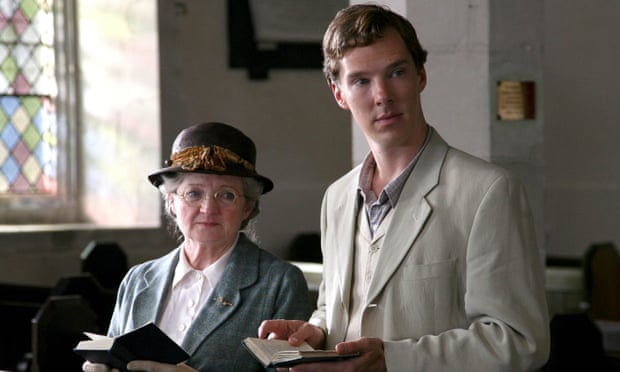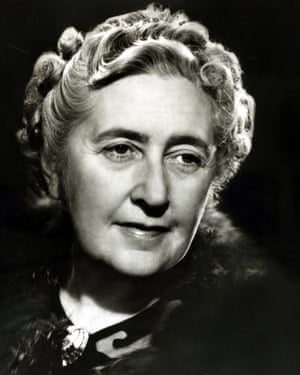Sarah Hughes

Julia McKenzie as Miss Marple, with Benedict Cumberbatch, in an ITV adaptation of Agatha Christie’s Murder is Easy. Photograph: ITV Plc

Julia McKenzie as Miss Marple, with Benedict Cumberbatch, in an ITV adaptation of Agatha Christie’s Murder is Easy. Photograph: ITV Plc
Forget domestic noir and put down all those books with “Girl” in the title. Crime fiction is turning back the clock to its golden age with a host of books that pay homage to the genre’s grande dame, Agatha Christie, either intentionally or in spirit.
Last week saw the publication of Closed Casket, Sophie Hannah’s second Hercule Poirot book, which “continues” the great sleuth’s life of solving crimes. The book has been published to coincide with what would have been the author’s birthday and to commemorate 100 years since she wrote her first published novel.
In October Hodder & Stoughton will bring out chatshow host Graham Norton’s first novel, Holding, described as a story of “love, secrets and loss” centring around a crime in a small village in Ireland. In May, Bloomsbury publishes Plum Sykes’s Party Girls Die In Pearls, the first of a new crime series billed as “Agatha Christie meets Clueless”, and Orion has just announced a deal with bonkbuster queen Tilly Bagshawe to write a new “cosy” crime series as MB Shaw. Meanwhile, reprints of 30s and 40s crime classics are continuing to sell well and HarperCollins has just commissioned writer and theatre-maker Stella Duffy to complete an unfinished novel by New Zealand crime writer Ngaio Marsh, set during the second world war.
There’s also a growing appetite at publishing houses for books by modern authors who can put their own spin on the golden age genre.
Alexandra Pringle, editor-in-chief at Bloomsbury, says that it bought Sykes’s series – which follows two undergraduates, one British and one a more worldly American, as they solve crimes in 1980s Oxford – because “it felt as if Dorothy Parker or Nancy Mitford were to try their hand at an Agatha Christie … subversive, wickedly funny and modern”.
Sykes herself says she’s a huge Christie fan who wanted “to take what I know I can do, which is high-society comedy and romance, and then add mystery to the mix”.
That said, Brawn warns that Christie’s deceptively simple style is not easy to get right. “There are definite challenges for modern authors. These days, crime writers rely a lot on police procedurals and technology, and to write a good golden age novel you really have to unlearn those things and embrace the disciplines of the golden age, which really centre around plot and character.”
The real appeal with Christie is that not only are they really good stories but there’s a lot going on under the surface, he says. “They’re sometimes unfairly dismissed as being a bit safe compared with today’s crime thrillers, but in reality there’s a lot of darkness there.”
James Prichard, Christie’s great grandson and the chairman of Agatha Christie Ltd, agrees. “There’s a terrible tendency to see golden age crime as cosy crime, but I think it’s pretty evident that my great-grandmother found murder a serious and horrific business,” he says. “The reason that these books have lasted and that so many people still read or try to emulate them today is because the plots stand up. People enjoy the puzzle elements in them and they like the fact that you might feel a little uncomfortable, but never so uncomfortable that you can’t go on.”
Last week saw the publication of Closed Casket, Sophie Hannah’s second Hercule Poirot book, which “continues” the great sleuth’s life of solving crimes. The book has been published to coincide with what would have been the author’s birthday and to commemorate 100 years since she wrote her first published novel.
In October Hodder & Stoughton will bring out chatshow host Graham Norton’s first novel, Holding, described as a story of “love, secrets and loss” centring around a crime in a small village in Ireland. In May, Bloomsbury publishes Plum Sykes’s Party Girls Die In Pearls, the first of a new crime series billed as “Agatha Christie meets Clueless”, and Orion has just announced a deal with bonkbuster queen Tilly Bagshawe to write a new “cosy” crime series as MB Shaw. Meanwhile, reprints of 30s and 40s crime classics are continuing to sell well and HarperCollins has just commissioned writer and theatre-maker Stella Duffy to complete an unfinished novel by New Zealand crime writer Ngaio Marsh, set during the second world war.
There’s also a growing appetite at publishing houses for books by modern authors who can put their own spin on the golden age genre.
Alexandra Pringle, editor-in-chief at Bloomsbury, says that it bought Sykes’s series – which follows two undergraduates, one British and one a more worldly American, as they solve crimes in 1980s Oxford – because “it felt as if Dorothy Parker or Nancy Mitford were to try their hand at an Agatha Christie … subversive, wickedly funny and modern”.
Sykes herself says she’s a huge Christie fan who wanted “to take what I know I can do, which is high-society comedy and romance, and then add mystery to the mix”.
That said, Brawn warns that Christie’s deceptively simple style is not easy to get right. “There are definite challenges for modern authors. These days, crime writers rely a lot on police procedurals and technology, and to write a good golden age novel you really have to unlearn those things and embrace the disciplines of the golden age, which really centre around plot and character.”
The real appeal with Christie is that not only are they really good stories but there’s a lot going on under the surface, he says. “They’re sometimes unfairly dismissed as being a bit safe compared with today’s crime thrillers, but in reality there’s a lot of darkness there.”
James Prichard, Christie’s great grandson and the chairman of Agatha Christie Ltd, agrees. “There’s a terrible tendency to see golden age crime as cosy crime, but I think it’s pretty evident that my great-grandmother found murder a serious and horrific business,” he says. “The reason that these books have lasted and that so many people still read or try to emulate them today is because the plots stand up. People enjoy the puzzle elements in them and they like the fact that you might feel a little uncomfortable, but never so uncomfortable that you can’t go on.”

No comments:
Post a Comment